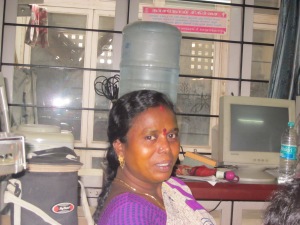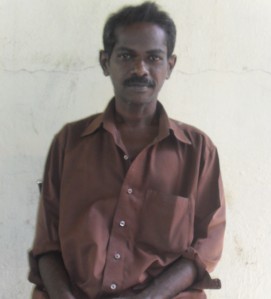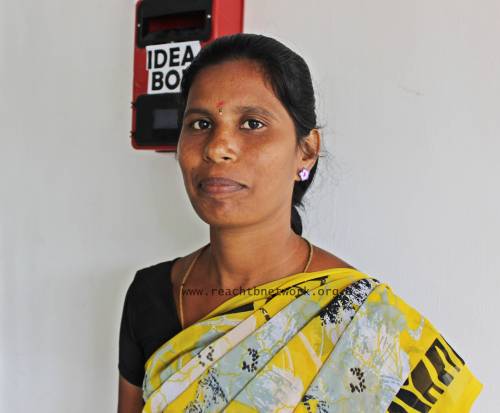 “When my husband got Tuberculosis, I had no idea what it was. My husband was an alcoholic and wasn’t concerned about me and our family. He didn’t take his medicines regularly. During the time of Chennai floods, I got a call from the DMC that my husband wasn’t taking regular treatment. I tried to convince him but eventually gave up. I was working as a house maid at that time. Someone from REACH came to visit us to follow-up on my husband’s treatment. During one of the visits, he told my mother that they were looking for a volunteer to work with REACH. My mother referred me as I have seen the disease up close. More
“When my husband got Tuberculosis, I had no idea what it was. My husband was an alcoholic and wasn’t concerned about me and our family. He didn’t take his medicines regularly. During the time of Chennai floods, I got a call from the DMC that my husband wasn’t taking regular treatment. I tried to convince him but eventually gave up. I was working as a house maid at that time. Someone from REACH came to visit us to follow-up on my husband’s treatment. During one of the visits, he told my mother that they were looking for a volunteer to work with REACH. My mother referred me as I have seen the disease up close. More
“When my husband got Tuberculosis, I had no idea what it was”
November 11, 2016
tbindianotes Patient Stories, Uncategorized, Unheard patient stories Patient Experiences, photo series, TB, TB Patient, tuberculosis Leave a comment
“TB is nothing to be afraid of…”
November 8, 2016
tbindianotes Patient Stories, Personal Experiences and Reflections, Uncategorized, Unheard patient stories photo series, TB, TB Patient, tb survivor, tuberculosis, voicesoftbheroes Leave a comment
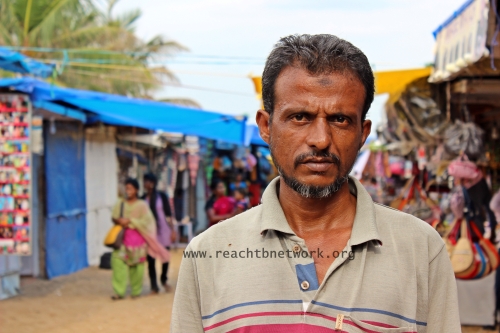
“I was a smoker at the time I was diagnosed with TB two years ago. The doctor told me I was even more at risk due to my habit of smoking. I was miserable because I couldn’t even hug or kiss my children when I wanted to.
I wanted to be healthy. In fact, even before I got TB, I was scared of going near my children because I used to smell of cigarettes all the time and it wasn’t healthy for my children. So, after starting treatment I quit smoking. More
“He died at 25 of TB, leaving me alone to face the world..”
November 7, 2016
tbindianotes Patient Stories, Personal Experiences and Reflections, Uncategorized, Unheard patient stories pediatric tb, photo series, TB, tb heroes, TB Patient, TB Project, tuberculosis 2 Comments
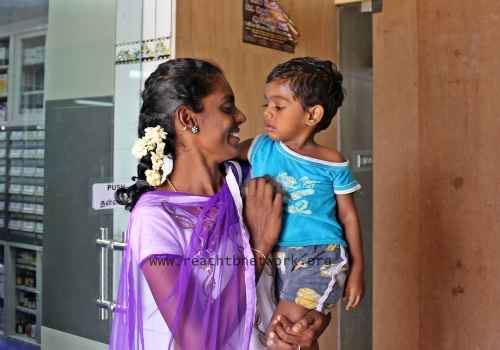
“My husband was a drug addict and an alcoholic. When he got TB, Suganya from REACH contacted me for getting tested. My children and I were taken for a screening test and X-ray and my younger child was diagnosed with Tuberculosis. Had Suganya not intervened, I wouldn’t have taken the issue seriously as I did not know that TB could have infected my family. My younger child has completed treatment but my older one was diagnosed recently and is on treatment.
My husband had all the bad habits, which made him prone to diseases like TB. When he couldn’t walk due to TB, I used to go to the center to fetch medicines but he would refuse to take them. It has been six months since my husband died. More
GENDER AND TB: A LONG WAY TO GO
June 8, 2016
tbindianotes Patient Stories, Pharmacy Initiative, Uncategorized Leave a comment
According to World Health Organization (WHO), “TB is nevertheless a leading infectious cause of death among women and about 700 000 women die of TB annually around the world.”
Why does it happen? What are the factors that make women die of TB?
Cultural and financial barriers can act as major obstacles for women seeking care resulting in delayed presentation and more severe illness. People with chronic, infectious diseases such as TB and HIV are generally stigmatized and avoided. Women suffer more stigma and discrimination than men. Stigma and discrimination make women reluctant to seek care for TB until the disease is advanced.
Saroja* is suffering from MDR TB today, backed up with her long story of malady unfavorably on her. Her initial treatment for TB was irregular due to constant family problems with her husband. TB was one of the main issues that made her husband to desert her and leave her utterly alone. She found it difficult to think about her illness and had to make several adjustments for herself and her children. She lost both the moral and financial support from her life partner. As per our cultural norms, a married woman’s life in society is marked by her marital status and if the husband deserts her, she becomes the ridicule of her family as well as the society. The social and financial stress forced her often to discontinue her treatment and she gradually ended up by developing drug resistant TB.
Savithiri*is an XDR TB patient, Being a spinster, she was taken care by her brother when she had undergone treatment for MDR TB. Her treatment got interrupted due to the sudden demise of her brother. She was totally isolated by her sisters who refused to provide her a nutritious diet. They just believed that their brother expired because he attended to her specially. The loss of economic security was of larger concern for having sick sister in the family. Family bonds can suffer when someone has TB and sometimes family members can be heartless in their actions. At present the patient is admitted in a tertiary hospital for her XDR treatment.
How can these women cope up to the rigors of TB treatment? With Absolutely no care from their loved ones, they are dependent on the care from the health system that is already heavily burdened.
Treatment for TB is not only lies in the qualitative, timely medical care, but also with the societal care of patients beyond any discrimination. Society must inculcate in people that they do not abandon their family member when they have TB, but try to adhere to the doctor’s advice and provide care. Psychological support cannot be provided with medicines alone, but with tender loving care, from the family members. Quality treatment and loving care are both necessary for patients with TB.
These patients were identified by pharmacists and have been directed to proper care services of the government. They are under regular follow up of the field officers. We hope the best treatment outcomes in spite of their life situations and hope that their families provide them the love and care they need.
*name changed to protect the identity
— shared by our Pharmacy Initiative Team.
CATASTROPHE OF WITNESSING THE ILLNESS
May 13, 2016
tbindianotes IMPACT, Patient Stories, Uncategorized Leave a comment
“I won’t take medicines till my exams get over” screamed the Sixteen years old boy, whose deceased father was a TB patient. The boy was diagnosed with TB when all members of the family were screened for TB. He witnessed the father’s illness and his statements of suffering about the sense of vomiting, stomach pain, fever, head ache etc. The words of his father sown strongly inside him and made him to feel that the TB treatment creates other illness which lead to state of in-activeness. He scared that his in-activeness made him not to study and get through the exams. But his deteriorating health condition worried the Health worker of REACH. The health worker counseled him continuously explaining the nature of the treatment and TB cure. He finally convinced to take medicines and also successfully completed his exams simultaneously.
RELIGIOUS CUSTOMS: A CHALLENGE IN TB CONTROL
May 13, 2016
tbindianotes IMPACT, Patient Stories, Uncategorized Leave a comment
TB Control not only lie with the success of treating TB patients alone but also with screening the family members of the patients for TB disease and with enrolling the positively diagnosed into the treatment of TB for Cure. This journey of Contact screening may not be the bed of roses for the health workers. They start from counselling to convince the contacts, then to follow up them for diagnosis and also with the treatment if needed.
We all know how strong the Religious Customs are! And how does it hold the people very firmly?! Let us see how does the health worker face this challenge?!!
“I myself preach the religion and how can I evade the practice… I will never ever do this” – uttered by a woman came for screening for TB persistently. She refused to remove her purdah in front of the male technician at the Lab for taking X-ray. Non availability of female technicians widely at Labs made the issue more complicated. The REACH staff, respecting her opinion, looks forward for searching the Lab with female technician for screening the Contact.
“God lives in me and he never let me get diseased” – the family member of the TB patient refused for TB screening. She further believed that the TB patient of the family did not embrace the religion and got the disease cuddle him. It is very challenging for a health worker to penetrate the deeply rooted faith of religious customs in TB control. Their attempt at this point could be more of balancing between the duty of controlling TB and also not to intrude the personal beliefs of the patients.
TB control is a challenge when it encounters with the strong Religious customs!!
“Being diagnosed with TB: Why Me?”
August 2, 2013
tbindianotes Patient Stories, Personal Experiences and Reflections Leave a comment
“When I was diagnosed with pleural TB six months ago, the first thought that popped into my head was, “Why me? I have done nothing wrong, what did I do to deserve this?” I had completed my engineering and was to be married in a few months. Several things worried me – would my fiancé accept that I had TB? It seemed better to just call it off. When the social worker told me that I had TB, I just broke down and cried for several hours, I couldn’t stop myself. I stayed depressed for days and seriously thought of calling off my impending wedding, but my mother helped me through that. And after being counselled by the social worker (Chithra ma`am) and speaking to several other TB patients, I was re-assured and began to take things in my stride – TB was curable, after all.
Today, I am in the sixth month of medication and feeling much better. All this while I have kept my condition a secret from everyone at home, including my husband. But today, I plan on telling him. I’m nervous, but I will tell him.”
– Srija* (patient’s named changed)
“I didn’t take TB seriously, until I got an ultimatum – death.”
August 2, 2013
tbindianotes Patient Stories Leave a comment
At first sight, Raju* (named changed for anonymity) looks older than his 27 years. His frame is thin and his eyes seem misty. He sits down and tells his story: “When I was diagnosed with sputum positive TB earlier this year, I did not take it seriously. Life seemed to go on as usual – I didn’t have a job and lived off my father’s earnings, I drank heavily every evening with my friends and didn’t take the anti-TB medicines regularly. My tests too began to show sputum negative for a couple of months, before I went back to being sputum positive. I even had fits at night. I had progressed to Cat 2 TB.”
The doctor at the hospital, where I go to take my DOTS medicine, then explained things clearly to me – he said they had saved me this once, but if I defaulted on medicines again, they would not be able to save my life. That’s when the full reality of the disease hit me. I have been to a de-addiction centre, and am now regularly taking medicines. There are side-effects sometimes – giddiness and nausea, but I am determined to complete the course of medicines this time. Over the past few months, I’ve completely given up alcohol – no more of that for me. My weight has increased by 10 kilos. And I even make a living delivering milk. I have reclaimed my life, and it would not have been possible without the prayers of my wife and mother, and the grace of God.”
– Story by: S Chitra, Social worker
Our long-time associate – CSI Rainy, Royapuram
February 12, 2013
tbindianotes Patient Stories, Personal Experiences and Reflections Leave a comment
Located in Royapuram, CSI Rainy is, as the hospital’s director puts it, “a private institution where people are sure they can receive individualised attention and care and avoid the long queues of government hospitals, at rates significantly lower than the norm elsewhere.” The hospital has been one of the earliest institutions to work with REACH and allow us a DOTS centre on their premises.
The DOTS centre is a small, somewhat cramped space, but it serves its purpose well – an area just below a staircase with dusty, metal checkered grills, fitted in with a cupboard, and a utilitarian table and chair for our social worker, Mrs Dheena. A standing rotatable fan stands right next to her. She tells me a little about her work hours, and is matter-of-fact about her daily routine as a counsellor and DOTS provider. Then, she starts sifting through a sheaf of charts to find the one she’s looking for – a story that will leave her teary as she recounts it.
Mrs Dheena, Social Worker, REACH
She points to a passport-sized photo of a keen-eyed man on the sheet, and the irredeemable ‘Deceased’ marking on it. “He died a few months ago. He was regular on treatment, but he was also HIV positive, and that claimed his life. His wife has also tested positive for HIV, but refuses to test their two girl children for HIV. I’ve been trying to convince her to do that and put them on some therapy, but I’m still trying,” she says, obviously trying to keep her emotions in check, “If the children test positive and can be put on treatment, it may add a decade or more to their lives – but their mother refuses to see this. She says that HIV took her husband away from her and she would rather not know.”
She abruptly puts the sheet aside, and moves on to show me documents of more of her current patients – some of them as young as 4 and 6. Her manner is matter-of-fact again, as she gets up to speak to an elderly couple, who have come with an X-ray result in hand. They look educated, well-dressed and ask her many questions – all of which she answers patiently. When they leave a few minutes later, Mrs Dheena talks again of how a lot of people are more comfortable coming to a private hospital like CSI Rainy, for their DOTS treatment, rather than a government institution – many a times, the patient isn’t treated with much empathy. Sadly, there aren’t too many who have allotted that space, as small as it may be, in this city.
Battling the bottle and TB meningitis
January 14, 2013
tbindianotes Patient Stories Leave a comment
Just as his battle with alcoholism was about to end, V Radhakrishnan found himself faced with another problem – TB meningitis, a condition that affects the brain and causes incoherence and confusion.
A goldsmith by profession, he arrived in Chennai about two decades ago and earned himself a good reputation at the jewelry shop he worked at, as a dedicated goldsmith with a keen eye for detail. But home was a different story – his alcoholism and violent, erratic drunken behavior drove his wife and two sons out of the house. They now live separately.
When he was diagnosed with TB meningitis last year, his employer stood by him through the clinical tests, helped him out of alcoholism, provided him room to stay in the jewelry store itself and now acts as his DOTS provider. Today, Radhakrishnan is on the road to recovery. For all of that, Radhakrishnan is immensely grateful to his employer.
But battling TB got Radhakrishnan re-evaluating his life. He grew remorseful of the way he had treated his family and wants to make amends with them – but right now, that doesn’t look positive. His wife, who initially wrote off his incoherent attempts to re-connect with them as drunken episodes, does not want to live with him, even after she was informed of his medical condition.
V Radhakrishnan, for his part, is now willing to be a DOTS provider to other patients.
Story: Sai Dinakar, Social Worker, REACH
